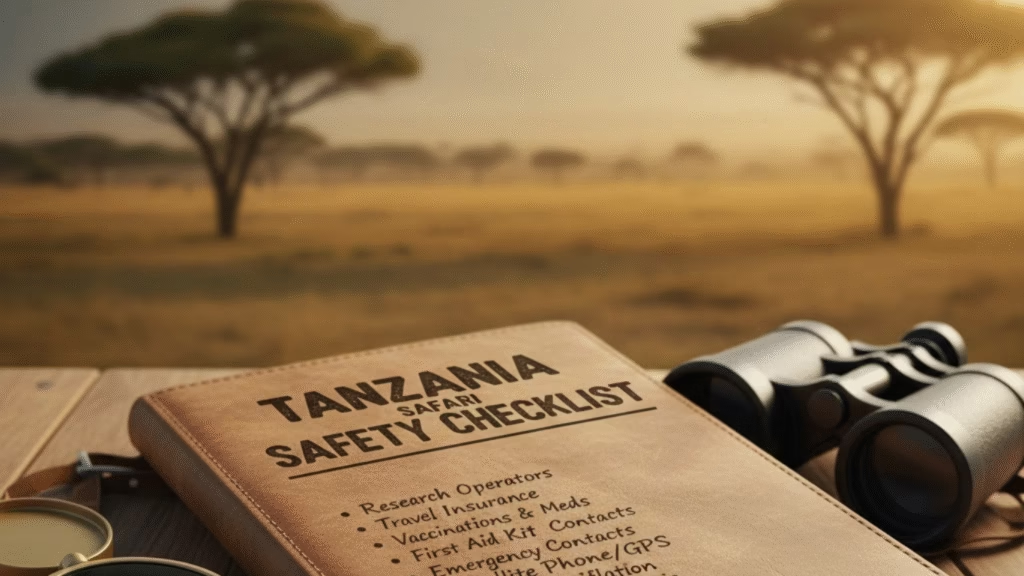Planning your dream Tanzania safari? Safety transforms good adventures into extraordinary ones. This comprehensive guide reveals essential health preparations, wildlife protocols, and packing strategies that protect you in Africa’s wilderness.
You’ll discover critical vaccination requirements, master animal behavior recognition, and learn exactly what gear prevents emergencies. From understanding Tanzania safari wildlife warning signs to navigating seasonal challenges, every checklist item addresses real safari scenarios.
Whether booking luxury packages or budget trips, these proven safety measures ensure unforgettable experiences without compromising security. Your African adventure deserves meticulous preparation. Discover how proper planning turns potential risks into confident exploration.
Pre-Safari Health and Medical Preparations
Staying healthy during your safari starts weeks before departure. Proper medical preparation protects you from preventable illnesses and ensures you’re physically ready for adventure.
Essential Vaccinations and Medications
Consult your doctor at least 6-8 weeks before traveling. Yellow fever vaccination is mandatory for Tanzania, while hepatitis A, typhoid, and tetanus shots are strongly recommended.
Pack antimalarial medication, as Tanzania has malaria-endemic regions. Bring a personal first-aid kit with bandages, antiseptic wipes, pain relievers, and any prescription medications in their original containers.
Travel Insurance Coverage
Invest in comprehensive travel insurance that covers medical evacuation, trip cancellation, and emergency healthcare. Tanzania safari experiences often take you far from hospitals, making evacuation coverage essential.
Verify your policy includes adventure activities like game drives and walking safaris. Keep digital and printed copies of your insurance documents accessible throughout your trip.
Physical Fitness Requirements
While tours and safaris in Tanzania don’t demand extreme fitness, moderate conditioning helps. Practice walking on uneven terrain and sitting for extended periods in vehicles.
Stay hydrated during your safari, drinking bottled water exclusively. Altitude considerations apply if combining your Tanzania safari and Kilimanjaro climb, requiring additional acclimatization planning.
Documentation and Emergency Contacts
Photocopy your passport, visas, vaccination certificates, and travel insurance. Store copies separately from originals and save digital versions in cloud storage. List emergency contacts, including your country’s embassy in Tanzania, safari operator’s 24-hour hotline, and family members.
Wildlife Safety and Behavior Guidelines
Respecting wildlife boundaries keeps both you and the animals safe. Understanding animal behavior and following professional guidance prevents dangerous encounters during your African safari in Tanzania.
Maintaining Safe Distances from Animals
Never exit your vehicle unless explicitly permitted by your guide. Animals may appear calm, but can attack if they feel threatened or surprised.
Use binoculars and zoom lenses for close-up views. Most Tanzania luxury safari packages include experienced guides who position vehicles safely for optimal viewing without disturbing wildlife.
Understanding Animal Warning Signs
Learn to recognize threat displays: elephants flapping ears, lions staring intently, or buffalo positioning themselves sideways. Immediately alert your guide to these behaviors.
Avoid sudden movements, loud noises, or direct eye contact with predators. Your guide’s instructions override all other considerations during wildlife encounters on private Tanzania safari tours.
Night Drive Precautions
Evening game drives offer unique wildlife viewing but require extra caution. Stay seated and keep limbs inside the vehicle at all times.
Flash photography can disorient animals and provoke aggressive responses. Use red-filtered lights when permitted and never point flashlights directly at wildlife during your Tanzania safari wildlife viewing.
Walking Safari Protocols
If participating in walking safaris, wear neutral-colored clothing and remain in a single file behind your armed guide. Speak in whispers and stop immediately when signaled.
Walk upwind to avoid alerting animals to your scent. These experiences offered by select Tanzania luxury safari lodges provide intimate wildlife encounters but demand strict adherence to safety protocols.
Campsite Wildlife Awareness
Are there crocodiles in Tanzania? Yes, along waterways and lake shores. Never approach water sources alone, especially at dawn or dusk when predators are most active.
Keep your tent zipped and food sealed in designated areas. Hippos and elephants may wander through camps at night, making flashlights and whistles essential for alerting others.
Packing Essential Safety Gear and Equipment
The right equipment transforms potential hazards into manageable situations. Thoughtful packing ensures comfort and preparedness throughout your luxury safari holidays in Tanzania.
Clothing and Footwear Selection
What to wear on safari in Tanzania includes lightweight, breathable fabrics in neutral colors—khaki, olive, and tan. Avoid bright colors and camouflage patterns. What shoes to wear on safari in Tanzania matters for comfort and safety.
Pack closed-toe hiking boots with ankle support for walking safaris and comfortable sneakers for game drives. Bring layers for temperature variations—mornings can be cool while afternoons grow hot. Long sleeves and pants protect against the sun, insects, and thorny vegetation.
Sun Protection and Hydration
Tanzania’s equatorial sun is intense year-round. Pack SPF 50+ sunscreen, wide-brimmed hats, and polarized sunglasses with UV protection.
Carry a refillable water bottle and hydration pack. Tanzania safari accommodation typically provides bottled water, but having personal containers ensures constant hydration during drives.
Communication and Navigation Tools
Bring a fully charged mobile phone with international roaming or a local SIM card. Download offline maps of Tanzania’s national parks and your safari route.
Pack portable power banks and solar chargers, as electricity can be limited in remote camps. Many private Tanzania safari packages include satellite phones for emergencies.
Personal Safety Items
Include a headlamp with red-light option, a whistle for emergencies, and a multi-tool knife. Pack insect repellent with DEET and mosquito netting if staying in unfenced camps. What to pack for safari in Tanzania should include a small daypack for game drives containing these essentials, plus binoculars, camera equipment, and field guides.
Document and Money Security
Use RFID-blocking pouches for passports and credit cards. Carry modest cash in small denominations, as ATMs are scarce in safari regions. Hotel safes protect valuables when you’re exploring. Keep photocopies of important documents separate from originals throughout your journey.
Environmental and Seasonal Safety Considerations
Understanding Tanzania’s climate patterns prevents weather-related mishaps. Seasonal variations affect road conditions, wildlife visibility, and health risks during your adventure.
Optimal Timing and Weather Patterns
Best time to visit Tanzania Serengeti is during the dry season from June to October when wildlife congregates around water sources. When is dry season in Tanzania varies by region but generally runs June through October.
The wet season brings beautiful landscapes but challenging road conditions. Some camps close during heavy rains, and malaria risk increases during these months.
Road and Vehicle Safety
Tanzania’s safari roads range from paved highways to rough tracks. Ensure your East African safari and touring company uses well-maintained 4×4 vehicles with roll bars and seat belts. Motion sickness can affect passengers on bumpy roads. Sit in forward-facing seats, focus on the horizon, and carry medication if you’re prone to nausea.
Water Safety Precautions
Only drink bottled or purified water. Avoid ice in beverages and raw vegetables unless you’re certain they’ve been properly washed. Never swim in lakes, rivers, or waterholes. Are there crocodiles in Tanzania? Absolutely, along with hippos and bilharzia parasites in freshwater bodies.
Altitude and Mountain Considerations
If your itinerary includes viewing the best view of Kilimanjaro from Tanzania, prepare for altitude changes. Amboseli and Arusha regions offer spectacular mountain vistas.
Those attempting a Tanzania safari and Kilimanjaro climb need specialized preparation, including acclimatization days, proper gear, and experienced guides from reputable East Africa adventure tours and safari operators.
Weather Emergency Protocols
Lightning storms can develop rapidly in Tanzania’s highlands. Seek shelter in vehicles or buildings, never under trees or in open areas. Flash floods can make roads impassable during the rainy season. Trust your guide’s judgment about route changes and schedule modifications for safety.
Frequently Asked Questions
What vaccinations do I need for a Tanzania safari?
Yellow fever vaccination is mandatory if traveling from endemic countries. Recommended shots include hepatitis A and B, typhoid, tetanus, and rabies for extended stays. Consult your doctor 6-8 weeks before departure for personalized recommendations and antimalarial prescriptions.
Is it safe to travel to Tanzania for a safari?
Tanzania safari destinations are generally safe when you follow professional guidance. Choose reputable operators, stay within designated areas, and obey wildlife viewing regulations. Most incidents occur when tourists ignore guide instructions or venture into restricted zones independently.
Your Safe Safari Adventure Awaits
A successful Tanzania safari balances thrilling wildlife encounters with sensible precautions. This checklist equips you with knowledge to navigate Tanzania’s wilderness confidently, from pre-trip medical preparations to on-the-ground safety protocols.
Whether choosing Kenya or Tanzania cheaper or booking Tanzania luxury safari lodges, prioritizing safety enhances every moment of your adventure.
With proper preparation, the right gear, and respect for nature’s power, your African safari becomes the transformative, worry-free experience you’ve always imagined. Start planning your adventure today with safety as your foundation for extraordinary memories.






